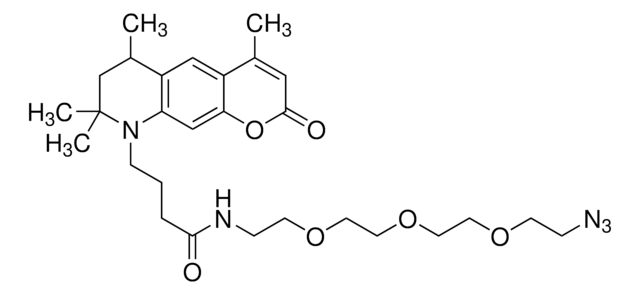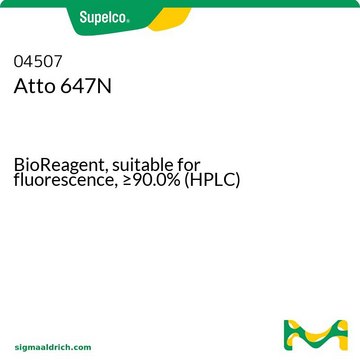Alle Fotos(1)
Wichtige Dokumente
05152
Atto 647N DPPE
suitable for fluorescence
Synonym(e):
1,2-Dipalmitoyl-sn-glycero-3-phosphoethanolamin markiert mit Atto 647N
Anmeldenzur Ansicht organisationsspezifischer und vertraglich vereinbarter Preise
Alle Fotos(1)
About This Item
UNSPSC-Code:
12352108
NACRES:
NA.32
Empfohlene Produkte
Assay
≥90.0% (HPLC)
Hersteller/Markenname
ATTO-TEC GmbH
λ
in chloroform/methanol (8:2)
UV-Absorption
λ: 643-649 nm Amax
Eignung
suitable for fluorescence
Lagertemp.
−20°C
Allgemeine Beschreibung
Atto 647N belongs to a new generation of fluorescent labels for the red spectral region. The dye is designed for application in the area of life science, e.g. labeling of DNA, RNA or proteins. Characteristic features of the label are strong absorption, excellent fluorescence quantum yield, high photostability, excellent ozone resistance, good solubility, and very little triplet formation. Atto 647N is a cationic dye. After coupling to a substrate the dye carries a net electrical charge of +1.
In common with most Atto-labels, absorption and fluorescence are independent of pH in the range of 2 to 11, used in typical applications. As supplied Atto 647N consists of a mixture of two isomers with practically identical absorption and fluorescence properties.
Atto-Dye Labeled Phospholipids
Sigma-Aldrich offers a variety of glycero-phospholipids carrying one or two fatty acid groups (lipophilic groups) and a phosphate ester residue (hydrophilic group). They are labeled at the hydrophilic head group. After incorporation of the phospholipid into a membrane the fluorophore is located at the water/lipid interface of the membrane. We currently provide 1,2-dipalmitoyl-sn-glycero-3-phosphoethanolamine (DPPE), 1,2-dioleoyl-sn-glycero-3-phosphoethanolamine (DOPE), palmitoyl-sn-glycero-phosphoethanolamine (PPE), and 1,2-dimyristoyl-sn-glycero-3-phospho-ethanolamine (DMPE) labeled with Atto-dyes.
find more information here
In common with most Atto-labels, absorption and fluorescence are independent of pH in the range of 2 to 11, used in typical applications. As supplied Atto 647N consists of a mixture of two isomers with practically identical absorption and fluorescence properties.
Atto-Dye Labeled Phospholipids
Sigma-Aldrich offers a variety of glycero-phospholipids carrying one or two fatty acid groups (lipophilic groups) and a phosphate ester residue (hydrophilic group). They are labeled at the hydrophilic head group. After incorporation of the phospholipid into a membrane the fluorophore is located at the water/lipid interface of the membrane. We currently provide 1,2-dipalmitoyl-sn-glycero-3-phosphoethanolamine (DPPE), 1,2-dioleoyl-sn-glycero-3-phosphoethanolamine (DOPE), palmitoyl-sn-glycero-phosphoethanolamine (PPE), and 1,2-dimyristoyl-sn-glycero-3-phospho-ethanolamine (DMPE) labeled with Atto-dyes.
find more information here
Rechtliche Hinweise
This product is for Research use only. In case of intended commercialization, please contact the IP-holder (ATTO-TEC GmbH, Germany) for licensing.
Lagerklassenschlüssel
11 - Combustible Solids
WGK
WGK 3
Flammpunkt (°F)
Not applicable
Flammpunkt (°C)
Not applicable
Hier finden Sie alle aktuellen Versionen:
Besitzen Sie dieses Produkt bereits?
In der Dokumentenbibliothek finden Sie die Dokumentation zu den Produkten, die Sie kürzlich erworben haben.
Nanoscale organization of nicotinic aceylcholine receptors by stimulated emission depletion microscopy.
Kellner, R.R., et al.
Neuroscience, 144(1), 135-143 (2007)
Stimulated emission depletion-based raster image correlation spectroscopy reveals biomolecular dynamics in live cells.
Hedde P.N.; et al.
Nature Communications, 4, 2093-2093 (2013)
Munc18-1 Tuning of Vesicle Merger and Fusion Pore Properties.
Jorgacevski, J.; et al.
The Journal of Neuroscience, 31(24), 9055-9066 (2011)
SNARE Function Is Not Involved in Early Endosome Docking.
Geumann, U.; et al.
Molecular Biology of the Cell, 19(12), 5327-5337 (2008)
STED Nanoscopy in Living Cells Using Fluorogen Activating Proteins.
Fitzpatrick, JA.; et al.
Bioconjugate Chemistry, 20(10), 1843-1847 (2009)
Unser Team von Wissenschaftlern verfügt über Erfahrung in allen Forschungsbereichen einschließlich Life Science, Materialwissenschaften, chemischer Synthese, Chromatographie, Analytik und vielen mehr..
Setzen Sie sich mit dem technischen Dienst in Verbindung.


